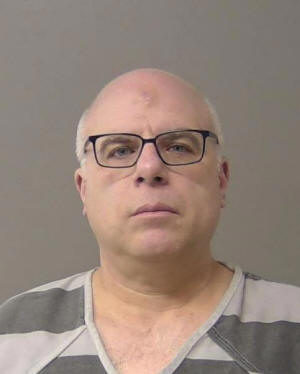Former GOP state lawmaker, candidate for governor sentenced to 42 months
in prison
 Send a link to a friend
Send a link to a friend
[July 10, 2024]
By HANNAH MEISEL
Capitol News Illinois
hmeisel@capitolnewsillinois.com
 SPRINGFIELD – Former Republican State Sen. Sam McCann on Tuesday was
sentenced to 42 months in federal prison for stealing nearly $700,000 in
campaign funds and attempting to conceal his theft with false reports to
state election authorities. SPRINGFIELD – Former Republican State Sen. Sam McCann on Tuesday was
sentenced to 42 months in federal prison for stealing nearly $700,000 in
campaign funds and attempting to conceal his theft with false reports to
state election authorities.
In February, McCann pleaded guilty to seven counts of wire fraud and one
count each of money laundering and tax evasion – but only after
prosecutors had spent nearly three days presenting evidence against him
at trial.
U.S. District Judge Colleen Lawless hearkened back to that moment as she
was handing down her sentence Tuesday afternoon, saying McCann’s refusal
to “accept responsibility” until the last possible moment factored into
her calculation for prison time. She also told McCann she was bothered
that he “continued to steal” all while “holding yourself out (to be) a
God-fearing public servant.”
“That may have been part of your stump speech and your public persona,”
Lawless said. “But just because you said it over and over does not make
it true.”
McCann appeared in Lawless’ courtroom clad in the gray-and-black striped
uniform of the Macon County Jail, where he’s been held since shortly
before his trial began in February. The judge had ordered him detained
when he disobeyed her directives after his sudden unexplained
hospitalization on the eve of trial further delayed court proceedings,
and she declined to release him on home confinement after his guilty
plea to await sentencing.

But in addressing Lawless on Tuesday, McCann said he was “thankful” for
his time in jail because of the relationships he was developing with
other detainees and correctional officers. He also said he was coming to
understand how some of the votes he took during his eight years in the
General Assembly translated to real-world policy that contributed to his
fellow detainees’ involvement with the criminal justice system.
“I’d trust these men more than some of my colleagues in Illinois
government,” McCann said of his fellow detainees.
A ‘brazen...fraud’
McCann was elected to the Illinois Senate in 2010, and then twice more
in 2012 and 2016. During his eight years in office, McCann represented a
rural district spanning from Springfield westward to the Missouri
border, sometimes breaking from his own party to vote in the interest of
organized labor – a key constituency for Democrats.
McCann’s disagreements with GOP leadership ultimately led to him leaving
the Republican Party and forming his own “Conservative Party.” In 2018,
McCann ran on his new third-party ticket for governor, garnering $3
million from the International Union of Operating Engineers – a funding
move seen as a strategic way to draw votes away from then GOP Gov. Bruce
Rauner, who was deeply unpopular with organized labor.
Though prosecutors alleged McCann’s illegal campaign spending dated back
to 2015, it ramped up in 2018, coinciding with McCann’s run for governor
and accompanying infusion of cash.
The government’s evidence included checks and bank statements showing
McCann used campaign money to pay two mortgages and delinquent loans in
addition to helping finance multiple vehicles and vacations. McCann also
fraudulently cut himself checks for work not performed and double-dipped
on reimbursement for miles driven.
[to top of second column]
|

Booking photo of Sam McCann from the Macon County Sheriff’s Office.

During the summer of 2018, federal agents approached McCann about his
campaign spending, but he denied any wrongdoing. In several hours of FBI
recordings of the meetings played during trial, McCann stumbled over his
explanations about why his campaign was paying to lease RVs and
properties McCann personally owned, while the agents warned him that
lying to them could land him in hot water.
Even so, Assistant U.S. Attorney Tim Bass reminded Judge Lawless on
Tuesday, McCann kept spending the campaign money all the way up through
mid-2020, including buying another RV and cutting himself regular checks
from the basically defunct Conservative Party of Illinois long after
losing his bid for governor.
Bass said the continuation of illegal campaign fund spending even after
multiple interviews with federal agents was McCann’s “most brazen” act
of “fraud.”
“This wasn’t a one-off. This wasn’t an anomaly,” Bass said. "He
continued to use campaign funds for his personal expenses up to the
point where there was nothing left.”
McCann was indicted in early 2021, two years after he left public office
after his failed third-party run for governor. He spent the next three
years after charges were filed against him maintaining his innocence,
refusing multiple plea agreements and eventually electing to represent
himself at trial after burning through multiple court-appointed
attorneys. Ultimately, however, McCann accepted legal representation
after his sudden hospitalization on the eve of his already-delayed trial
in February.
On Tuesday, attorney Jason Vincent asked Lawless for 12 months in prison
– way below the sentencing guidelines that suggested an imprisonment of
between 37 and 46 months. Bass had asked Lawless to give McCann the
maximum 46 months.
Vincent argued that McCann had already “been disgraced through his own
actions” and pointed to the number of pre-sentencing letters of support
he’d received from McCann’s family, friends and even former
constituents.
While Lawless said the show of support from McCann’s family was
encouraging, the judge said she ultimately viewed his actions in the
larger context of other public corruption cases.
“Greed coupled with the abuse of power has become expected of public
servants,” she said.
In addition to his prison sentence, McCann was also ordered to pay
$683,816.61 in restitution, which will be split between Local 150 and
the Illinois Education Association, which gave to McCann for his
campaigns prior to 2018.
Capitol News Illinois is
a nonprofit, nonpartisan news service covering state government. It is
distributed to hundreds of newspapers, radio and TV stations statewide.
It is funded primarily by the Illinois Press Foundation and the Robert
R. McCormick Foundation, along with major contributions from the
Illinois Broadcasters Foundation and Southern Illinois Editorial
Association.
 |